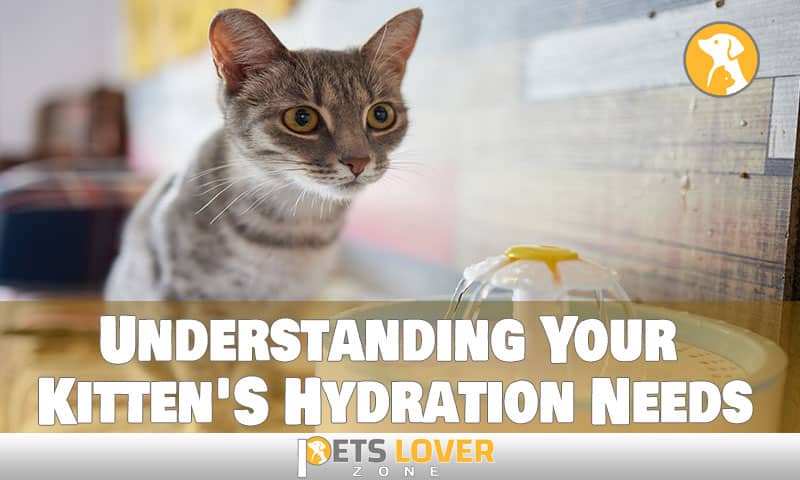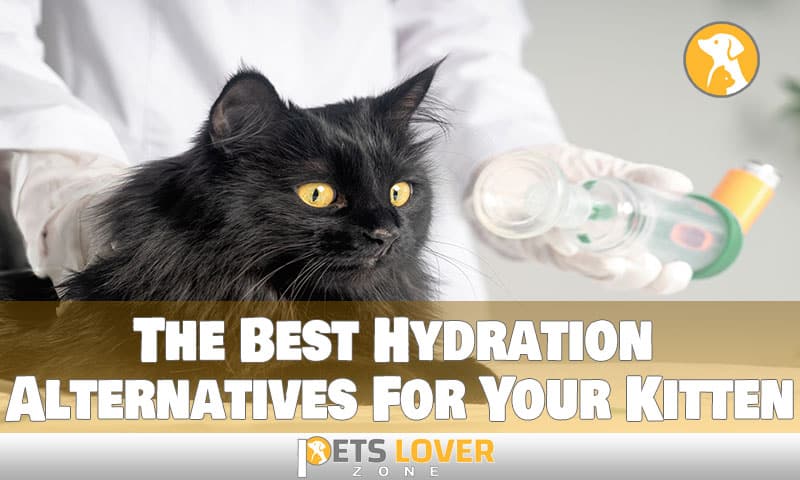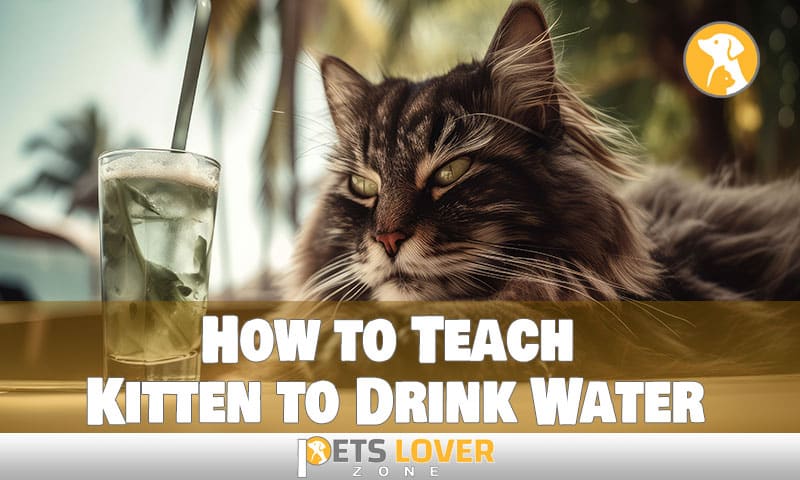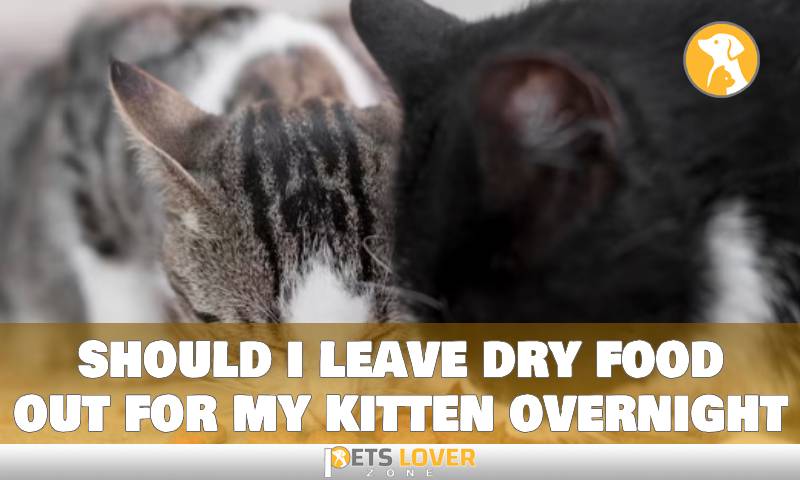To teach a kitten to drink water, introduce them to a bowl of fresh water consistently and use a shallow bowl to avoid spilling. Kittens need plenty of water to stay hydrated and maintain their health.
However, some kittens may be hesitant to drink water or not know how to drink from a bowl. In this article, we will discuss how to teach your kitten to drink water using simple and effective methods. By following these tips, you can ensure that your kitten stays hydrated and healthy.
Why Hydration Is Important For Your Kitten
Kittens are adorable animals that need lots of attention and care in their early days of life. One of the crucial aspects of caring for a kitten is ensuring they stay hydrated at all times. In this blog post, we’ll discuss why hydration is important for your kitten and how you can check for signs of dehydration.
The Importance Of Hydration For A Healthy Kitten
Kittens’ bodies consist of 75% water, which is why it’s vital to ensure they drink enough water throughout the day. Hydration is essential for a kitten’s overall health, as it helps to:
- Regulate body temperature
- Keep organs functioning properly
- Promote healthy digestion and prevent constipation
- Maintain healthy skin and coat
- Strengthen the immune system and prevent infections
The Risks Of Dehydration In Kittens
Keeping your kitten hydrated is crucial because dehydration can be life-threatening. Some of the risks of dehydration in kittens include:
- Organ failure
- Heatstroke
- Urinary tract infections
- Kidney issues
- Lethargy and weakness
How To Check If Your Kitten Is Dehydrated
As a responsible kitten parent, it’s essential to check your fur baby regularly for signs of dehydration. Here are some of the signs you should look out for:
- Dry gums and tongue
- Lethargy and depression
- Sunken eyes
- Loss of skin elasticity
- Poor appetite and weight loss
If you believe your kitten may be dehydrated, it’s crucial to take quick action to prevent further complications. Provide your kitten with fresh water immediately, and if symptoms persist, contact your veterinarian.
Ensuring your kitten drinks enough water is vital for their overall health and well-being. By keeping these tips in mind, you can ensure your fur baby stays hydrated and healthy, whether you’re at home or on the go.
Understanding Your Kitten’S Hydration Needs

Kittens have high water needs and require enough daily water intake to keep them hydrated, healthy, and active. Here are some important factors that affect your kitten’s water intake and the amount of water they need daily.
The Amount Of Water A Kitten Needs
- The amount of water your kitten needs daily depends on their age, size, diet, and activity level.
- A general rule of thumb is that kittens should drink at least ½ to 1 ounce of water per pound of body weight per day.
- For example, a 4-pound kitten would need about 2 to 4 ounces of water daily.
What Affects A Kitten’S Water Intake
- Kittens that eat kibble food will generally drink more water than those that eat wet food since wet food contains more moisture.
- Your kitten’s activity level, environmental temperature, and health condition can also affect their water intake.
- Kittens that play and exercise more will need more water since they lose fluids through sweating, panting, and urination.
Factors To Consider When Determining Your Kitten’S Water Intake
- The type of food your kitten eats affects their water intake. Dry kibble requires more water while wet food requires less.
- Your kitten’s water bowl should always be clean and fresh to encourage them to drink water.
- Proper hydration is crucial to your kitten’s overall health and well-being. Remember to monitor their water intake and seek veterinary care if necessary.
By understanding your kitten’s hydration needs and providing them with a suitable amount of water, you can help keep your furry friend happy, healthy, and hydrated.
Ways To Encourage Your Kitten To Drink More Water
Are you having trouble getting your kitten to drink water? It’s important to make sure your kitten is staying hydrated, especially during the hot summer months. Read on to discover the best types of water for kittens, tips to make water more appealing to your kitten, and ways to ensure your kitten has access to fresh water at all times.
The Best Types Of Water For Kittens
- Filtered water is the best option for kittens. This type of water is free from impurities, and it also removes chemicals such as chlorine.
- Spring water is a good option if you are unable to provide filtered water. Spring water is naturally filtered through rocks and soil, which ensures that it is free from harmful contaminants.
Tips To Make Water More Appealing To Your Kitten
- Keep the water bowl clean. A dirty bowl can make water unappealing to kittens, so make sure to wash it out regularly.
- Use a shallow bowl. Kittens may be hesitant to drink from deep bowls, so use a shallow dish that is easy for them to access.
- Add flavor. Place a few drops of tuna juice or chicken broth in the water to make it more enticing. However, only use this method sparingly as it can add unnecessary sodium to your kitten’s diet.
- Place ice cubes in the water. Kittens enjoy playing with ice cubes, so adding them to the water can make it more appealing and encourage them to drink.
How To Ensure Your Kitten Has Access To Fresh Water At All Times
- Have multiple water sources available. Provide water bowls in different locations in your home so your kitten can easily access water.
- Use a water fountain. Some kittens prefer running water, so investing in a water fountain may encourage them to drink more.
- Refill the bowl regularly. Check the bowl throughout the day and top it up when necessary to ensure that your kitten always has access to fresh water.
By following these simple tips, you can encourage your kitten to drink more water and keep them hydrated. Remember, it’s important to monitor their water intake and ensure that they always have access to fresh, clean water.
The Best Hydration Alternatives For Your Kitten

Teaching your kitten to drink water is essential for their health and well-being. As a responsible owner, it’s your duty to ensure that your kitten stays hydrated at all times, especially during the hot summer months. We’ll explore the best hydration alternatives for your kitten.
Wet Food And Its Benefits For Hydration
Wet food is an excellent way to keep your kitten hydrated, as it has a high water content. Here are some benefits of feeding your kitten wet food:
- Wet food is 70-80% water, which helps to keep your kitten hydrated.
- It’s easier to digest and helps prevent constipation, which can lead to dehydration.
- Wet food contains high-quality protein and essential nutrients, which are necessary for your kitten’s growth.
- It’s a great option for fussy eaters as it comes in different flavors and textures.
Homemade Broths And Their Benefits
Homemade broths are another excellent way to keep your kitten hydrated. Here are some benefits of making homemade broth:
- Homemade broths are easy to make and cost-effective.
- You can control the ingredients and ensure that your kitten is getting all the essential nutrients they need.
- Broths can be frozen for later use, making it a convenient option for busy owners.
- Your kitten will love the taste, and it will encourage them to drink more water.
To make homemade broth, simply boil some chicken or beef and add some vegetables like carrots and peas. Let it simmer for a few minutes, strain the broth, and let it cool. You can also freeze the broth in ice cubes and give it to your kitten as a treat.
Supplements That Promote Hydration In Kittens
While wet food and homemade broths are excellent hydration alternatives, some supplements can help promote hydration in kittens. Here are some supplements that you can try:
- Electrolyte supplements can help replace lost fluids and prevent dehydration.
- Probiotic supplements can help improve digestion and prevent constipation.
- Omega-3 supplements can help keep your kitten’s skin and coat healthy, preventing skin-related dehydration.
It’s important to consult your veterinarian before giving any supplements to your kitten.
Teaching your kitten to drink water is crucial for their health and well-being. The best hydration alternatives include wet food, homemade broths, and supplements that promote hydration. By incorporating these alternatives into your kitten’s diet, you’re ensuring that they stay hydrated and healthy.
How To Monitor Your Kitten’S Hydration
Many pet owners face the challenge of how to monitor their kitten’s hydration in its early stages. While it is essential for kittens to have access to water at all times, they may not be inclined to drink enough. This is especially true if they’ve just been weaned off their mother’s milk.
In this section, we’ll discuss some signs of dehydration in kittens, techniques for monitoring their hydration levels, and when to seek veterinary help for your furry friend.
Signs Of Dehydration In Kittens
As a pet owner, it’s crucial to know the signs of dehydration in kittens. Some common indicators of dehydration include:
- Sunken or dry eyes
- Dry and sticky gums
- Thick, sticky saliva
- Loss of skin elasticity and flexibility
- Lethargy or decreased activity levels
If you notice any of these symptoms, you must take appropriate steps to ensure your kitten is hydrated.
Techniques For Monitoring Hydration Levels
There are several ways to monitor your kitten’s hydration levels. These methods include:
- Check the water bowl: Make sure that fresh water is available at all times, and monitor how much your kitten is drinking.
- Observe urine output: The frequency and color of your kitten’s urine can indicate their hydration levels. You can scoop the litter and look for signs of dehydration: darker urine, or not much urine at all.
- Pinch test: A quick and easy way to determine if your kitten is dehydrated is by performing a pinch test. To do so, gently pinch the skin in between the shoulder blades and release. The skin should spring back to its original position if your kitten is hydrated, but if it takes a moment to settle or stays pinched, your kitten may be dehydrated.
When To Seek Veterinary Help
It is essential to seek veterinary help if your kitten displays any signs of severe dehydration or is reluctant to drink water. Dehydration can lead to serious complications, such as kidney failure. If you are in doubt, don’t hesitate to get in touch with your veterinarian.
Monitoring your kitten’s hydration levels is essential to keeping them healthy and happy. By understanding the signs of dehydration, monitoring their water intake, and seeking veterinary help when needed, you can ensure your kitten remains hydrated and healthy.
FAQs
How Do I Teach My Kitten To Drink Water?
To teach your kitten to drink water, provide a clean and shallow bowl, place the bowl in inaccessible areas, and encourage your kitten to drink water by tapping your finger in the water bowl.
How Much Water Should A Kitten Drink?
Kittens should consume an ounce of water per pound of body weight daily. Keep water available for your kitten throughout the day and change it frequently.
Can Kittens Drink Milk Instead Of Water?
Milk is not a suitable replacement for water, especially for kittens. Kittens may experience diarrhea or become lactose intolerant when given milk instead of water.
Why Isn’t My Kitten Drinking Water?
Your kitten may not be drinking water due to an underlying medical condition, discomfort, stress, a dirty water bowl, or a preference for running water. Consult your vet if this persists.
Conclusion
Teaching your kitten to drink water can be a challenging task, but with patience and consistent training, you can succeed in helping your furry friend develop healthy hydration habits. Remember to choose the right water bowl and place it in an accessible location.
Use positive reinforcement techniques and encourage your kitten to drink water whenever possible. Keep their water bowl clean and fresh, and monitor their water intake regularly, especially during hot weather or after physical activity. As a responsible pet owner, it’s essential to ensure that your kitten stays hydrated, as it supports their overall health and well-being.
So, don’t hesitate to start training your kitten today and witness the joy of healthy and happy companionship.





